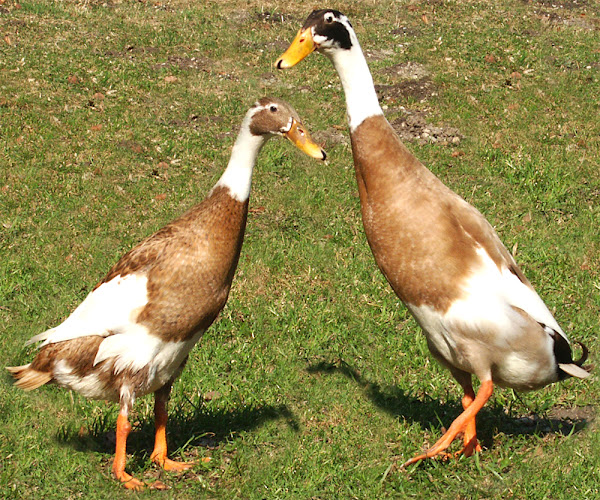Indian Runner duck farming is a very common and popular business. Because this breed is highly productive and is very common throughout the world. The breed is native to the Indian-sub-continent and was found on the Indonesian islands of Bali, Java and Lombok.
Although the name of this breed is ‘Indian Runner’, but there is no evidence that they came originally from India. And the breed was probably originated from the East Indies – Java, Lombok and Malaya.
The term ‘Indian’ may well be fanciful, denoting a loading port of the transport by ‘India-men’ sailing ships of the East India Company. And such misname happened with many other waterfowl breeds imported into the America and Europe. For example, the African goose (which is actually not from Africa), the Muscovy duck (which is actually not from Moscow) and the Black East Indian duck (which is actually not from India).
The Indian Runner duck is a very old breed and it has a long history as evidenced by ancient Javan Temple carvings. Which indicates that the Indian Runner type ducks existed in Indo China, 2000 years ago. And people in this area have been raising ducks for hundreds of years. And they trained their ducks to forage on the paddy fields and look for grain, weed seeds, insects, snails, small reptiles, larvae etc.
The Indian Runner duck became popular in America and Europe towards the end of the 19th Century, as a good egg laying duck breed. And today the breed is still a very good eggs layer.
Today, the Indian Runner ducks are mainly raised for their eggs production. And many other good modern duck breeds have been created from the Indian Runner ducks.
However, the Indian Runner ducks are excellent egg layers. They generally lay up to 250 eggs per year. So starting a commercial Indian Runner duck farming business for eggs production can be profitable. And you can also sell the ducks for meat after they have stopped laying eggs.
How to Start Indian Runner Duck Farming
The Indian Runner ducks are very strong, hardy and productive birds. They generally require less caring and other management. So, starting Indian Runner duck farming business is relatively easy and simple. Here we are trying to describe more information about starting and operating a successful Indian Runner duck farming business from purchasing ducks to caring and marketing.

Purchase Ducks
First of all, try to purchase very good quality, healthy and disease-free ducks from any of your nearest poultry market or existing Indian Runner duck farms. The Indian Runner ducks are very common and highly available throughout the world. So you will probably be able to easily purchase these ducks. You can also search your local online classified websites.
Housing
A good housing not only helps the ducks to stay healthy but also helps them to stay free from all types of predators and adverse weather conditions. So try to make a good, comfortable, and safe house for your ducks.
Install a good ventilation system while building the house, and ensure the flow of sufficient fresh air and light inside the house. As a light breed, on average a mature Indian Runner duck will require between 3 and 4 square feet housing space.
Make the house in such a way so that you can easily clean the house. And you should clean the house on a regular basis for keeping the house healthy for the ducks.
Feeding
Feeding the birds with high quality and nutritious food is the most important part of Indian Runner duck farming business. So always try to feed your ducks with enough good and nutritious food. And never feed them with polluted or contaminated feeds.
For commercial Indian Runner duck farming business, you can feed your ducks with ready-made/commercial layer duck feeds or poultry feeds. And always provide them with enough clean and freshwater as per their demand.
Breeding
The Indian Runner ducks are naturally very good breeders. So you don’t have to worry much about breeding. Just keeping a good ratio of male and female ducks will be enough. For successful breeding results, keep one male duck with around 10 female ducks.
Caring
The Indian Runner ducks are very strong and hardy birds, and they generally require less caring and other management. Although taking additional caring will ensure good growth and also good health of the birds. Vaccinate your ducks timely and always keep good contact with a vet in your area.
Marketing
Marketing duck’s products is not a problem. Both (meat) and eggs of ducks have very good demand and value in the market. So you will probably be able to easily sell the products in your local market. Although, you should set your marketing strategies before starting this business.
12 Reasons Why Duck Eggs are Better Than Chicken Eggs
1. Duck eggs stay fresher longer
Because duck eggs have a naturally thicker shell and inner membrane (most likely because wild ducks tend to lay their eggs next to water, so the shell needs to keep out moisture and mud), they will stay fresher, longer.
They are also less likely to break if you drop one by accident.
I’ve actually had duck eggs bounce off the ground after dropping them!
2. Duck eggs are richer and creamier
Due to their much larger yolk and higher fat content, duck eggs are richer and creamier, and taste less watery than chicken eggs.
The whites are super thick which makes for a great poached or fried egg.
3. Duck eggs are more “eggy”
The taste of any type of egg does depend on the overall diet of the bird, but I find duck eggs to be more “eggy” and flavorful.
Others have described the taste of a duck egg as “gamey”.
Ducks are great foragers if you can allow them some time on grass and will rival your chickens in how many insects, worms, slugs and bugs they will eat.
4. Duck eggs contain more protein + “different” protein
Duck eggs contain more protein than chicken eggs – about 30% more – and it’s a different protein, so those allergic to chicken eggs can often eat duck eggs and vice versa.
5. Duck eggs are more nutrient-dense
Any bird allowed to free-range or graze on pasture will lay eggs with more nutrients than caged birds.
But ounce for ounce, duck eggs contain more Omega-3, Vitamins A and D, fatty acids, choline, folate, and iron than chicken eggs.

6. Duck eggs are better for baking
Because duck eggs contain more fat and protein – and less water – than chicken eggs, they tend to produce fluffier cakes, higher meringues and souffles, lighter breads and cookies.
7. Duck eggs sell for higher prices
Due to their relative scarcity and superior qualities for baking especially, duck eggs will often sell for a premium to pastry chefs, Asian restaurants or foodies.
While chicken eggs generally sell between $2-3/dozen (with organic closer to $5 a dozen) nationwide, duck eggs often fetch $6-12 a dozen.
8. Lower feed conversion
In addition to being able to sell your duck eggs for higher prices than your chicken eggs, ducks generally have a lower feed conversion ratio – meaning a duck needs to eat less feed than a chicken does in order to produce one egg.
That will save you money on feed.
9. Duck eggs are larger
To make duck eggs even more economically beneficial, while ducks generally lay one egg about every day, more or less like chickens, since their eggs are about 30% larger, ounce for ounce you’ll end up with more egg volume-wise from your ducks.

10. Ducks lay year-round
Ducks also tend to lay better year-round than chickens.
Because they need a bit less light to stimulate their ovaries to release a yolk, our ducks continue to lay through the winter without added light in their house and are unconcerned by dark, wet days.
12. Ducks have a longer productive life
While chickens will only lay at their peak for a year or two and then production will start to drop off, ducks often have a longer, more productive laying life than chickens, laying well for 3-4 years.
12. Ducks are low maintenance with a lower mortality rate
Ducks are honestly so much lower maintenance than chickens.
Ducklings have a far lower mortality rate, not being susceptible to Mareks, Avian flu, or Coccidiosis like baby chicks.
Ducks are also far also cold-hardy, more heat-tolerant, healthier overall, not as susceptible to parasites, and don’t destroy your lawn or landscaping nearly as much.
Duck eggs are just as versatile as chicken eggs and can be cooked and eaten any way you would cook chicken eggs. Just be sure not to overcook them. Their low water content can make them rubbery if they’re fried or scrambled too long. Cook them just until the whites are no longer watery and you should be fine.

